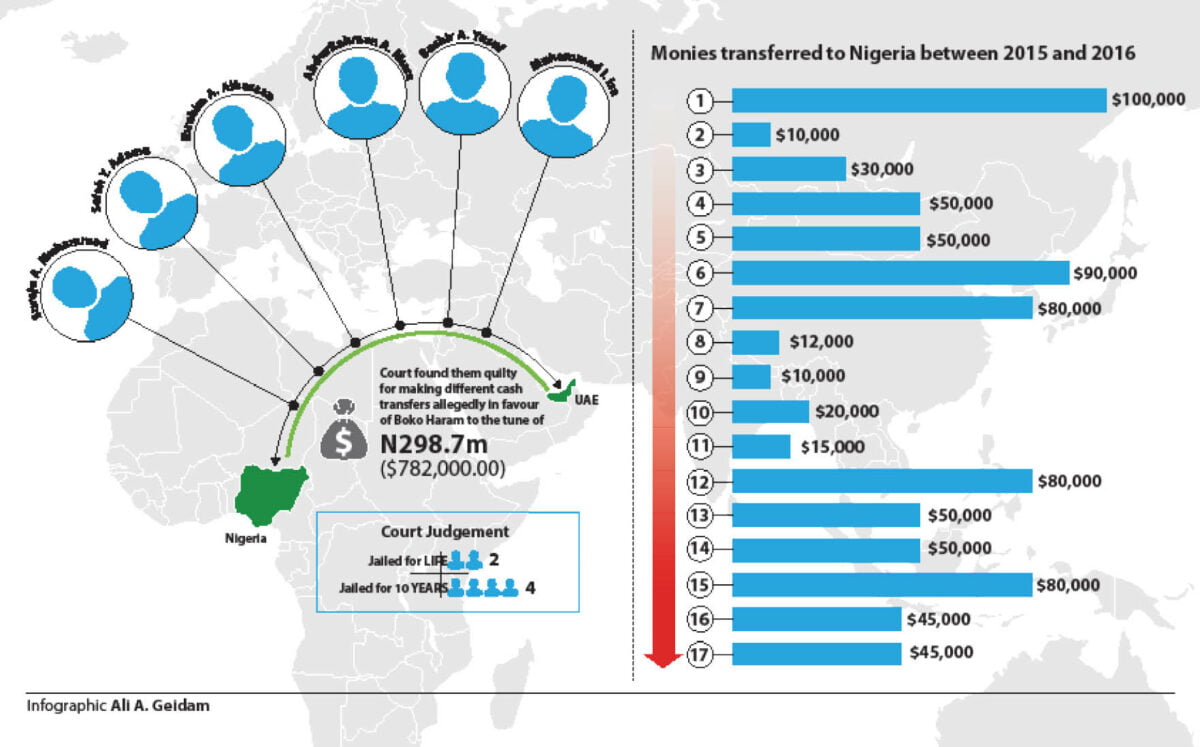Six Nigerians accused of funding a terrorist organization, Boko Haram have been convicted by an Abu Dhabi Federal Court of Appeal in the United Arab Emirates (UAE). Court records reveal that between 2015 and 2016, the convicts were allegedly involved in cash transfers totaling $782,000 (₦297,355,500) to Boko Haram.
Here are 7 things the money could have been used to boost Nigeria’s economy:
- AGRICULTURE
In line with the Sustainable Development Goals (SDGs), zero hunger is the second goal to be achieved. However, due to the insecurity in Nigeria, scarcity of farm materials, fertilizers, increase in the price of fuel and bad roads are contributing to the scarcity of food, increase in the price of food and reduce farm produced. Insecurity on the farmland, scarcity of fertilizer, non-availability of animal feed are among the problems that farmers face. The Boko haram funds could have been used to improve the security in states, availability of farm materials even transportation of the goods and the money could have been used as a loan to farmers.
Agriculture is one of the biggest contributors in Nigeria, asides from oil. The agricultural lands in Nigeria are capable enough to supply food for the whole nation and possibly export farm produce to other countries.
- HEALTH SECTOR
Currently, doctors in Ondo State are on indefinite strike due to unpaid salaries. The Association of Resident Doctors in Ondo State called for the action over the failure of the government to heed to their demands. The health sector lacks a lot of infrastructures, equipment, even qualified medical practitioners. The arrival of COVID-19 reflected how poor the Nigerian health sector is, even the leaders seek medical help abroad as the health sector here lacks a lot. The health sector needs to be invested in greatly to improve the quality of health given, also to promote the well-being of the people and reduce death rates. A great deal of work is needed in the health sector which currently is poor. Last week, the Senate asked President Buhari to stop foreign medical trips and invest in the health sector, though in 2019, Buhari lamented that Nigeria loses too much to medical tourism, urging stakeholders to come up with a solution.
- SCHOOL FEEDING PROGRAM
The school feeding program was introduced in 2016 as part of the Social Investment Program of Buhari’s led administration. The aim of the program is to support states to collectively feed over 24 million school children, which will make it the largest school feeding program of its kind in Africa.
To avoid malnutrition during the lockdown, the federal government continued the school feeding program.
Malnutrition is a key issue in Nigeria, of which the school feeding program aims to solve, the Protein challenge awareness campaign also seeks to eradicate protein deficiency especially in Nigeria. Due to the growing population in Nigeria, for the feeding program to be successfully carried out, the budget allocated would have to cover all children of which the government alone can not carry. Donation of farm produces, even money would go a long way on helping the FG achieve the school feeding program, the money donated to the terrorist group which is close to ₦300million would have done a great impact here.
- SALARY FOR LAW ENFORCEMENT
The law enforcement officers have lamented about unpaid salaries and low income after the #EndSARS protest. President Muhammadu Buhari had in 2019 approved a new salary structure for the law enforcement agents but it is yet to be implemented.
- INTERNALLY DISPLACED PERSONS (IDP) CAMP
The existence of the militant Islamist group Boko Haram has triggered significant displacement in the marginalised north-east of the country since 2014. The tensions in the central region/affected regions have culminated in significant levels of violence and displacement.
According to Internal Displacement Monitoring Centre (IDMC), ‘latest attacks affected 1,992 individuals, including 51 injuries and 44 fatalities, in Birnin Gwari LGA of Kaduna State, Rogo LGA of Kano State, Dandume, Faskari, Safana LGAs of Katsina State and Bukkuyum, Maradun, Maru, Shinkafi, Tsafe LGAs of Zamfara State between the 26 October – 1 November 2020. The attacks caused people to flee to neighbouring localities. In the first half of 2020, there were 32,000 new displacements associated with conflict and violence and 8,800 as a result of disasters.’
Donation and effective security are part of the things that can be done to help the affected persons and even the camp, etc.
- NATIONAL YOUTH SERVICE CORPS (NYSC) INSURANCE SCHEME
President Muhammadu Buhari on Monday Ordered Brigadier-General Shuaibu Ibrahim the Director-General of National Youth Service Corps (NYSC) to enrol corps members into the National Health Insurance Scheme.
The NYSC on Tuesday mobilised 66,000 graduated across all states to participate in Batch B service for 2020. The DG said “the scheme has concluded arrangement with the NHIS for the enrolment of corps members into the NHIS in line with a presidential directive. We have also expended huge resources on critical health needs of corps members, including footing of medical bills.
“As of last Thursday, a total of 66,000 eligible graduates had been mobilised for the 2020 Batch B service year, resuming on Tuesday, November 10. They will participate in the orientation exercise, which has been planned in three streams for ease of compliance with the COVID-19 protocols.”
The money donated to the militants could benefit the corps members based on their allowance and even the proposed health insurance scheme.
- INFRASTRUCTURE
Nigeria has borrowed about ₦31 trillion to boost the infrastructure, transportation, agriculture etc. Nigeria is a developing nation which lacks a lot of infrastructure in roads, hospitals, basic amenities etc.
Development of infrastructures in Nigeria would lead to profit in the economy in terms of investment amongst others.
READ ALSO: How Much it May Have Caused Biden to be President
